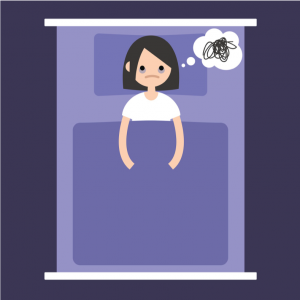In this week’s EDIT Blog Mythbusters series, Meg and Daniel explain why depression, and other mental health conditions, should be taken as seriously as physical health problems.
“Depression isn’t merely feeling sad; it is a serious mental health condition which requires treatment.”
Mental health conditions such as depression are often not viewed as ‘real’ illnesses, like physical health problems, but as an emotional state that you can ‘snap out’ of. But depression isn’t merely feeling sad; it is a serious mental health condition which requires treatment. It interferes with daily life, relationships and work. Depression was, in fact, the second leading cause of disability worldwide in 2010, particularly affecting females and working-age adults (1). The prevalence and global economic cost of depression are only rising, making it an increasingly recognised public health priority. Employers are also beginning to perceive depression as a genuine illness which requires serious attention, but progress towards accepting and addressing the issue is still in early stages.
Consider the following – you have caught the flu and you are feeling extremely lethargic, your appetite is off and you are sleeping too much. You phone into work and explain that you won’t be coming in. You make no effort to hide the evidence of your scratchy throat and stuffy nose, and try to persuade yourself not to worry about the work you’re missing or any other commitments you have on. You focus on getting better by resting and drinking lots of fluids, or perhaps going to your GP for medicine if it persists for a long time.
Now consider you have depression. You feel very low, perhaps hopeless, and are unable to enjoy everyday activities. Your appetite might change and you may have difficulty getting to sleep, or you sleep too much. You feel tired and find it difficult to concentrate. This continues for weeks. Do you phone into work sick? Do you seek help? Many people do not, largely due to the stigma around mental health. Much of this stigma comes from the common perception that conditions like depression are not really illnesses, but just episodes of low mood that you can ‘push through’.
“Depression is usually not a condition that just goes away on its own, like a cold.”
Working while you’re unwell, known as ‘presenteeism’, has been described as “being at work, but not working” (2). Presenteeism among people with depression has been shown to account for 5-10 times as much lost workplace productivity as being absent from work (3). Presenteeism was also shown to be higher in high-GDP countries, where people may avoid disclosing their depression to employers out of fear of losing their job. This is particularly worrying because depression is usually not a condition that just goes away on its own, like a cold. The stress of having to keep working while hiding depression from employers can prevent people from taking the time out to seek proper help for their depression symptoms, ultimately prolonging the debilitating condition.
 Depression has long been recognised by clinicians and researchers as not just an emotional state but a physiological condition. Alongside physical symptoms like fatigue, sleep and appetite disturbances, people with depression are consistently found to have impaired brain function. This includes structural and functional impairments in areas like the hippocampus, amygdala and orbitofrontal cortex, which are responsible for functions like memory, emotional responses and decision-making (4). Brain function is influenced both by our environment and our genetics. Events like trauma, stress and the cumulative effects of genetic variants can all influence the brain and thus affect cognition, emotions and behaviour. There is also mounting evidence that depression is linked to immune function, and more recent research is exploring the interplay between the gut microbiome and brain (5).
Depression has long been recognised by clinicians and researchers as not just an emotional state but a physiological condition. Alongside physical symptoms like fatigue, sleep and appetite disturbances, people with depression are consistently found to have impaired brain function. This includes structural and functional impairments in areas like the hippocampus, amygdala and orbitofrontal cortex, which are responsible for functions like memory, emotional responses and decision-making (4). Brain function is influenced both by our environment and our genetics. Events like trauma, stress and the cumulative effects of genetic variants can all influence the brain and thus affect cognition, emotions and behaviour. There is also mounting evidence that depression is linked to immune function, and more recent research is exploring the interplay between the gut microbiome and brain (5).  Depression is increasingly recognised as a genuine health condition that can persist and worsen without treatment. That treatment might be a psychological talking therapy, antidepressant medication, or a combination of the two. One of the aims of the GLAD Study is to identify what treatments work for whom so that patients can get the optimal treatment in the first instance. Importantly, helping people become more informed about the seriousness of depression is a crucial step towards people seeking the treatment they need and breaking the stigma that keeps people with depression and other mental health conditions from suffering in silence.
Depression is increasingly recognised as a genuine health condition that can persist and worsen without treatment. That treatment might be a psychological talking therapy, antidepressant medication, or a combination of the two. One of the aims of the GLAD Study is to identify what treatments work for whom so that patients can get the optimal treatment in the first instance. Importantly, helping people become more informed about the seriousness of depression is a crucial step towards people seeking the treatment they need and breaking the stigma that keeps people with depression and other mental health conditions from suffering in silence.
References
1 – Ferrari, A. J., Charlson, F. J., Norman, R. E., Patten, S. B., Freedman, G., Murray, C. J., Vos, T., & Whiteford, H. A. (2013). Burden of depressive disorders by country, sex, age, and year: findings from the global burden of disease study 2010. PLoS medicine, 10(11), e1001547.
2 – Johns, G. (2010). Presenteeism in the workplace: A review and research agenda. Journal of Organizational Behavior, 31(4), 519-542.
3 – Evans-Lacko, S., & Knapp, M. (2016). Global patterns of workplace productivity for people with depression: absenteeism and presenteeism costs across eight diverse countries. Social psychiatry and psychiatric epidemiology, 51(11), 1525-1537.
4 – Drevets, W. C., Price, J. L., & Furey, M. L. (2008). Brain structural and functional abnormalities in mood disorders: implications for neurocircuitry models of depression. Brain structure and function, 213(1-2), 93-118.
5 – Valles-Colomer, M., Falony, G., Darzi, Y., Tigchelaar, E. F., Wang, J., Tito, R. Y., Schiweck, C., Kurilshikov, A., Joossens, M., Wijmenga, C., & Claes, S. (2019). The neuroactive potential of the human gut microbiota in quality of life and depression. Nature microbiology, 4(4), 623.



